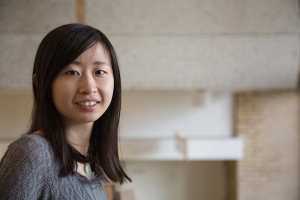The International Precious Metals Institute (IPMI) awarded Yuying Song, a chemical engineering doctoral student at the UH Cullen College, the 2016 Colt Refining Student Award for her work exploring catalysts made of precious metal alloys.
The IPMI is a leading association dedicated to the efficient and environmentally sound use and reuse of precious metals. The Colt Refining Student Award is a highly competitive award for graduate students whose research expands the potential for precious metal applications.
Song received the award for her dedication to two research projects involving precious metals. For her first and primary project, Song works with her faculty advisor Lars Grabow’s research group to identify higher activity diesel oxidation catalysts that can help reduce harmful emissions from low temperature combustion (LTC) engines. The research group, which is sponsored by the National Science Foundation and the Department of Energy, includes chemical engineering professors Vemuri Balakotaiah, Bill Epling and Dan Luss. The group also includes Michael Harold, M.D. Anderson Professor and chemical and biomolecular engineering department chair.
LTC engines provide a promising alternative to traditional diesel combustion engines, she said, because they have higher fuel efficiency and produce less nitrogen oxide and particulate matter. But the diesel oxidation catalyst used in traditional combustion engines is less effective with LTC engines. Diesel oxidation catalytic activity increases with temperature but, because LTC engines produce less heat in exhaust than diesel combustion engines, the catalytic activity is decreased with LTC engines.
Using computational methods, Song has screened various catalysts made of precious metals and precious metal alloys to find a more active catalyst and she is working with an undergraduate student to test her theoretical predictions with experiments.
“I want to apply my knowledge of precious metals to find a catalyst that increases catalytic activity, so that low temperature combustion engines can become more widespread,” she said.
Though the projects are not directly connected, Song’s second project uses one of the most promising catalysts she’s identified, a palladium-copper alloy (Pd-Cu).
Song’s collaborator Dean Toste, professor of chemistry at the University of California-Berkeley, studies the activity and selectivity of Pd-Cu alloys as catalyst for the Guerbet reaction—an organic reaction that converts alcohols with a low molecular weight into oxygenates with a higher molecular weight. Guerbet reactions are commonly used to make materials such as plastics, industrial lubricants and fuel additives. Song provides the theoretical and computational work to help interpret the experiments with the alloy catalyst conducted by Toste’s research group. Based in part on Song’s contributions the research team discovered that the Cu atoms in the Pd-Cu alloy gain activity without compromising their selectivity for the desired Guerbet coupling pathway. This unexpected result was recently published in the prestigious Journal of the American Chemical Society.
As a recipient of the Colt Refining Student Award, Song presented her work on both projects at the annual IPMI Conference held in Phoenix, Arizona earlier this year. At the conference, she had the opportunity to network with industry professionals and learn first-hand about several large companies in the precious metals field.
“It’s a great honor to win this award, especially because of the connection to industry,” said Song. “I feel like I learned so much at the conference, talking to managers and industry leaders.”
